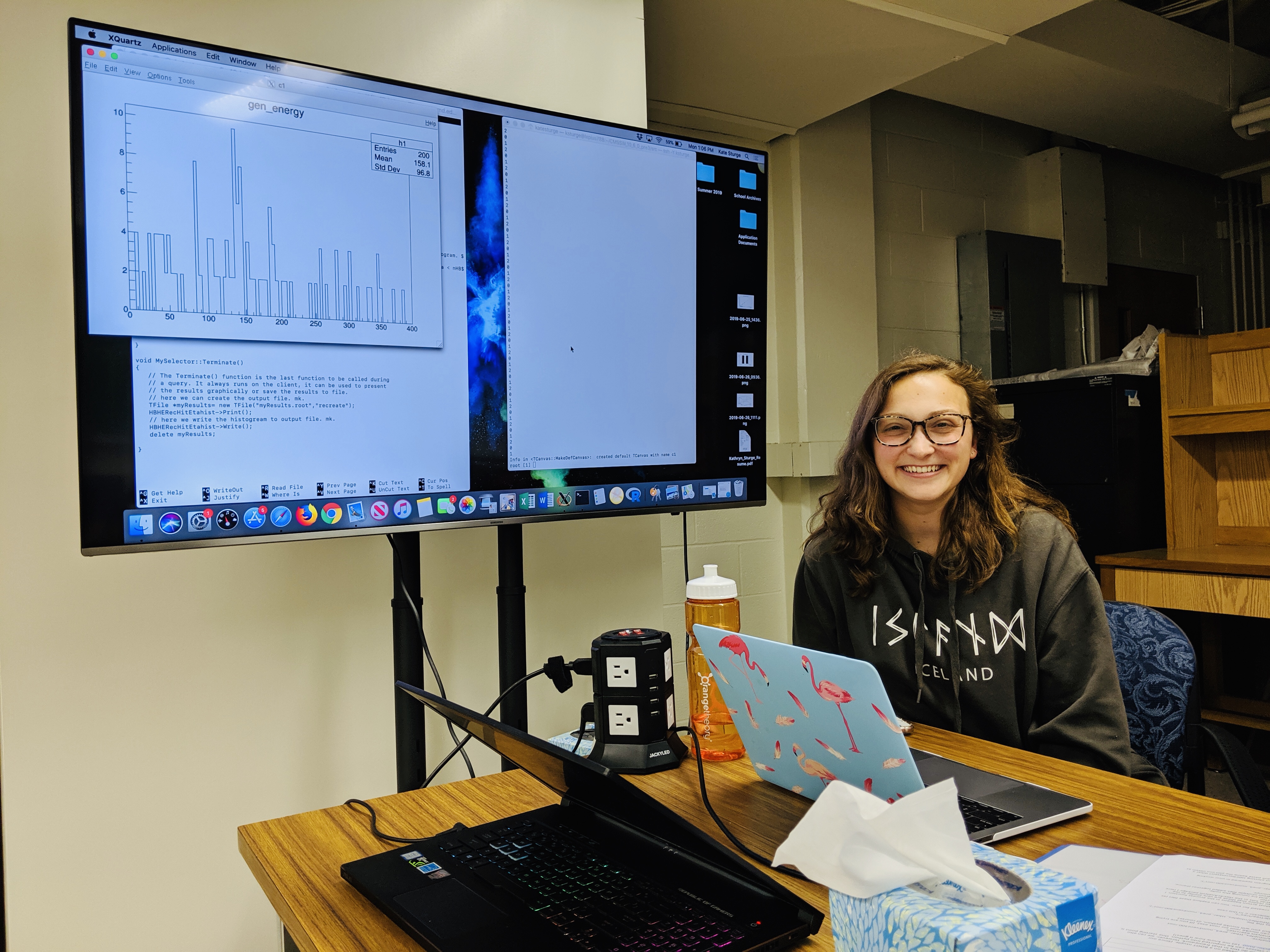- Details
-
Published: Friday, September 03 2021 00:11
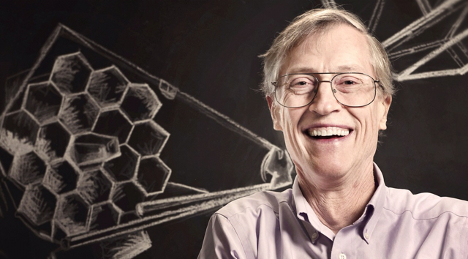 John Mather Credit: NASA/Chris GunnThe past contains lessons that cannot be learned in the present. And although the past is often like a hazy crystal ball that is challenging to interpret, it is still instructive if we want to understand ourselves and our position in the universe.
John Mather Credit: NASA/Chris GunnThe past contains lessons that cannot be learned in the present. And although the past is often like a hazy crystal ball that is challenging to interpret, it is still instructive if we want to understand ourselves and our position in the universe.
To understand the origins of our universe, cosmologists piece together the subtle, lingering clues of a past that predates humanity as well as Earth. To do so, they must look past our local galactic neighborhood and study distant parts of the universe that might be forever beyond humanity’s reach.
John Mather, a College Park Professor of Physics at the University of Maryland and a senior scientist at NASA, has pursued his curiosity about the origins of the universe and succeeded at peering into the furthest reaches of the past, earning a Nobel Prize along the way.
“We can't see the Earth's history,” Mather said. “But we can see examples way out there. So what happened to make it possible to go from the Big Bang to Earth? We have a story of how that would happen. But most of it’s made up—most of it’s imaginary. So we have to check it by actually looking.”
Later this year, Mather will add a new chapter to his storied career. After decades of work, NASA is launching a revolutionary instrument into space, the James Webb Space Telescope—and Mather is the senior project scientist. The Webb telescope is bigger than the Hubble Space Telescope or any other telescope ever launched. It has about 6.25 times more area dedicated to collecting light than the Hubble, and it is designed to reveal for the first time sights of the primordial formation of some of the earliest stars and planets in the universe. Mather has spent the last quarter of a century helping make this ambitious project a reality.
The Dazzling Past
Mather shared the 2006 Nobel Prize in physics for uncovering secrets in the ancient, invisible remains of some of the universe’s first light, captured using the NASA Cosmic Background Explorer (COBE) satellite. This primordial light is called cosmic microwave background radiation and is constantly bombarding Earth (and every other part of the universe) from every direction. The ancient light is a dim but persistent messenger from that long-gone age, and it provides a unique window into the universe’s earliest moments.
COBE revealed that this radiation was a cosmic fingerprint with subtle variations. And that fingerprint proved to be the vital clue needed to establish the Big Bang theory as the accepted explanation for the birth of our universe (although Mather isn’t fond of the firework imagery summoned by that name for the beginning of an expanding, infinite universe).
Scientists think that the uneven pattern observed in the radiation resulted from the early universe being hotter and denser in some areas than others. This revelation is researchers’ main lead as to why matter ended up clumping together into stars, planets, galaxies and all the other objects that fill our universe. Those initial hot and cold pockets were the first dominoes that led to Earth and the rest of the dynamic universe we see today.
Reflecting on his fruitful career, Mather said that he thinks successful science, like the COBE mission, is the result of teamwork, a little bit of luck and pursuing your curiosity despite adversity.
For instance, COBE grew directly out of some of Mather’s graduate work that delivered disappointing results. He and his colleagues first tried measuring the cosmic background radiation from White Mountain in California. They learned a little bit about the radiation, but the tumultuous atmosphere prevented them from seeing details that could tell them about the early universe.
So they tried even greater heights—literally—by sending the measurement equipment up 25 miles using a balloon. The first flight failed to produce any results, and the next attempt didn’t happen until after Mather graduated. When the balloon-borne equipment finally managed to successfully collect data, it still lacked the desired precision.
Despite these troubles, the idea stuck in Mather’s head, and the project unexpectedly got a new life when NASA called for proposals for satellite experiments in 1974, just five years after the Apollo landing.
“I said, ‘Boss, my thesis project failed, we should try it in outer space,’” Mather said. “So he said, ‘We'll write a proposal.’ And that kept on not losing. At every possible place where you could be stopped, we found a way to keep on going. So 15 years later, it was launched.”
The data collected by COBE finally revealed the subtle details needed to interpret the radiation and left Mather and the rest of the scientific community with plenty of work to do. Those early hot and cold spots are just part of the story of the origin of everything.
Mather continued to investigate the origins of the universe and, in 2011, became an adjunct professor at UMD in addition to working at NASA. His current work is still unraveling the mystery of what the formative years of the universe looked like, and this time, with the help of a massive team, he hopes to get a look at the formation of some of the earliest galaxies.
An Unfolding Story
Mather recalled getting started on the Webb telescope with a call in 1995 asking if he wanted to work on a new telescope project that NASA was considering.
“Of course, I said, ‘Yes, that would be the coolest thing.’” Mather said. “And so that's what I've been doing ever since.”
Mather and his colleagues developed a plan for a telescope to observe things that are invisible to COBE, Hubble and every other satellite ever launched. The goal is to see more than 13.5 billion years into the past (when the universe was only about a couple of hundred million years old) and to take baby pictures of our universe that show the formation of the earliest galaxies and how they birth stars.
“One of the great mysteries is what was it like back then,” Mather said. “And we've never been able to see. The telescopes that we have are not powerful enough and do not observe at the right wavelength. So you just can't tell.”
The Webb telescope will gaze into that distant past by collecting light that is mostly invisible to the human eye. Light travels as waves of electric and magnetic fields, and the color of the light is determined by the distance between the wave peaks. The Webb telescope will look at the longest light waves humans can see—red—and the invisible light that is even more stretched out—infrared. (Infrared light is given off by human bodies and many other objects and is what night vision goggles detect.)
These long waves interest cosmologists because the universe is expanding, and as it expands, it also stretches out light. Light that starts out as blue (the shortest light we see well) gradually becomes yellow and then red and eventually infrared (and continues getting stretched into even longer, harder-to-detect wavelengths). Any light that has been traveling for billions of years since the birth of early galaxies has had plenty of time to stretch out.
We can’t see the past of our own corner of the universe, but by collecting and interpreting this stretched light, we can see the past of the far-distant part of the universe that the light came from.
The Webb telescope will be a revolutionary tool in observing the ancient and distant universe to check if our theories about that primordial time are correct. It is a big project that goes beyond the efforts of just NASA. The mission is a collaboration with the Canadian Space Agency and the European Space Agency and involves scientists from 14 countries, 29 U.S. states and the District of Columbia.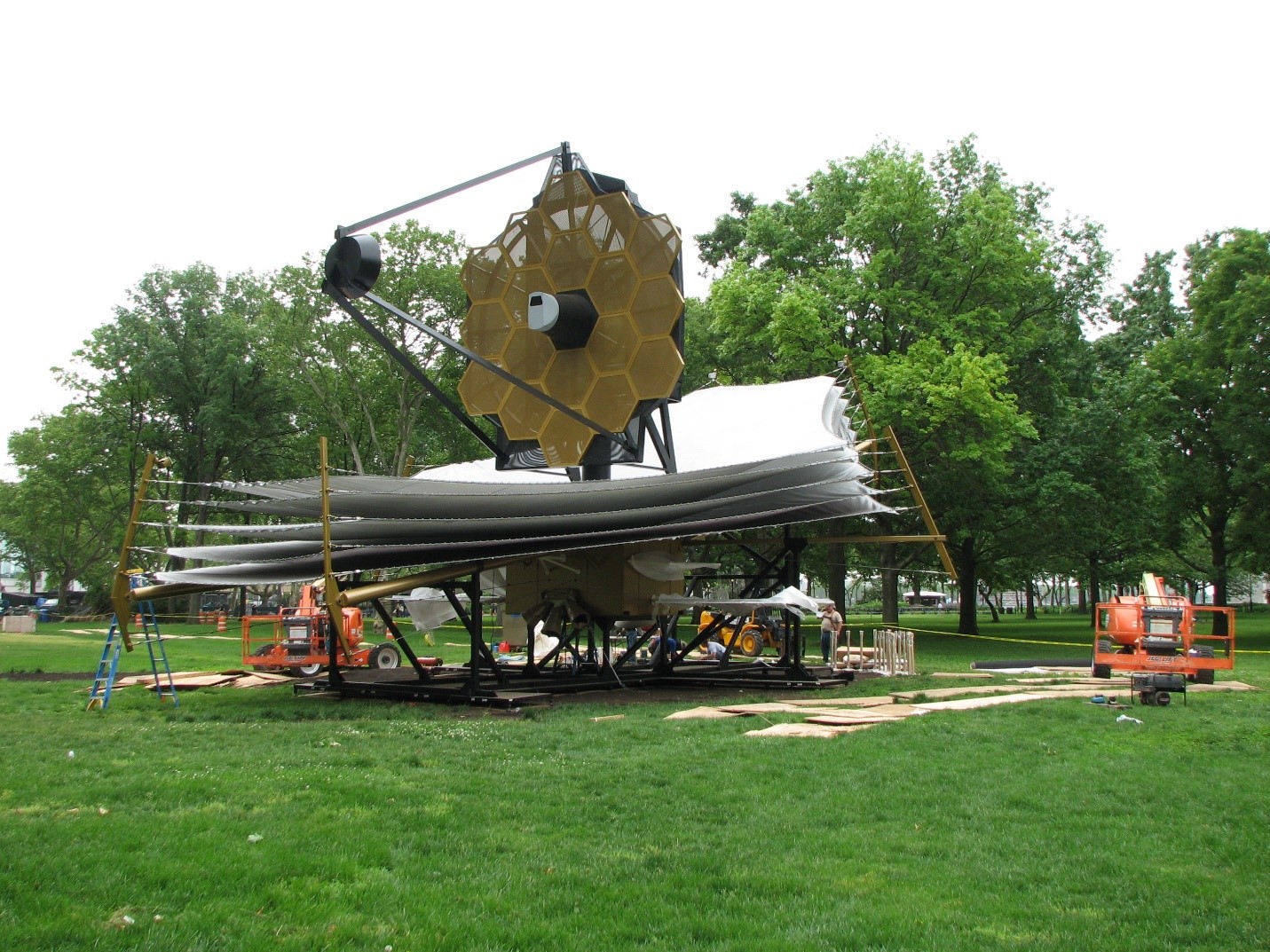 A full-scale model of the James Webb Space Telescope being constructed at Battery Park in NYC for the 2010 World Science Fair. (Credit: NASA)
A full-scale model of the James Webb Space Telescope being constructed at Battery Park in NYC for the 2010 World Science Fair. (Credit: NASA)
As the Webb telescope’s senior project scientist, Mather works with other scientists to identify what the telescope needs to do to make new discoveries and then works with engineers and managers to turn those grand visions into reality.
“I am at the interface between two worlds, and it's a very interesting place to be,” Mather said. “Of course, the work is really done by the participants saying, ‘Well, this is what my idea is,’ and somebody else says, ‘Well, I have a different idea.’ And then we have another idea. And then we have discussion, and maybe a little bit of hand-to-hand combat. Sometimes actually, instead of hand-to-hand combat, we have a vote, but that's not usually done, because usually it's pretty clear what is needed.”
This back-and-forth has been a lengthy process. By 2009, 14 years after Mather got involved in the project and five years after construction started, NASA targeted a launch date in 2013. But the project has suffered repeated delays. Technical difficulties with the telescope and complications from the COVID-19 pandemic contributed to recent delays. Now, the long-awaited launch is looking promising for the end of 2021.
“There's an awful lot of translation from the wish into a plan,” Mather said. “The Webb has taken about 25 years since that first phone call that I got. And most of that wasn't building; most of that was deciding what to build. When you're reaching so far beyond where anybody has ever been, you can't just draw a sketch and say, we'll build that. You have to say, ‘This is the set of inventions that we require, please go make those inventions, and then we'll decide something.’ So that took a good, long time just to even get started on the inventions.”
The team’s work includes making the telescope capable of maintaining a difference of 600 degrees Fahrenheit between the parts most heated by the sun and the coldest instruments with cooling systems and a tennis court-sized parasol. The giant parasol (or as NASA calls it, a “sunshield”) and a gold-covered mirror that is more than 21 feet across are made to fold up like origami for the rocket launch and then to unfold in space.
The team’s inventions and clever solutions combine into a telescope expected to be good enough to detect the amount of heat given off by a bumble bee from as far away as the moon is from Earth. All of the technology is designed to be deployed about a million miles from Earth (about 4 times farther from Earth than the moon). If everything goes according to plan, it will take about six months from launch to get the telescope into location, set up, tested and ready to perform science.
A Promising Future
The Webb telescope will let scientists do more than peer into the early history of the universe, though. Infrared light should let them peek into cosmic dust clouds that block visible light and study the formation of stars and planets that are not too far from our solar system (which formed more recently). It might even reveal new details of neighboring celestial objects like the moons of Saturn or the dwarf planet Pluto. It will also be able to detect water vapor and other chemicals in the atmospheres of planets outside our solar system.
Researchers from all over the world have the chance to suggest how to best use this technological marvel. Of the proposals selected for the first year of the telescope’s observation, about 10% came from students. Just as Mather’s proposal for the COBE satellite launched his success, other stellar careers might take off with this new telescope.
Mather said he is proud that the Webb telescope mission is providing opportunities to early-career scientists. And despite the Webb telescope keeping him busy at NASA’s Goddard Space Flight Center in nearby Greenbelt, Maryland, he still values his connection to the university.
“We have a pretty strong connection between NASA Goddard and the University of Maryland,” Mather said. “Especially, we cooperate in high-energy physics, astronomy, cosmic rays, X-rays, gamma rays and things that people at the university have a lot of expertise in. I'm glad to be a member of the department. And I look forward to talking with people that I have shared interests with. I invite people to contact me about the Webb telescope and about any other ideas that they have, especially for space astronomy.”
The best advice Mather says he can offer students is just telling them what worked for him. He credits his success to finding people he liked to work with and persistently tackling interesting questions with them despite setbacks.
“I can't say that setbacks are fun,” Mather said. “But in our business of science, they're all the time. Treat failures as setbacks and learning opportunities and think about what else you would do next. While I was working on the balloon payload, I had in the back of my mind, ‘Well, the problem with this balloon is that it's not in outer space.’ And when NASA asked for proposals, I said ‘Well, I've got an idea.’ So when a good idea comes to you and you can't do it now, keep it. And maybe you'll get a chance later. The future is long. Probably infinite.”
Written by Bailey Bedford
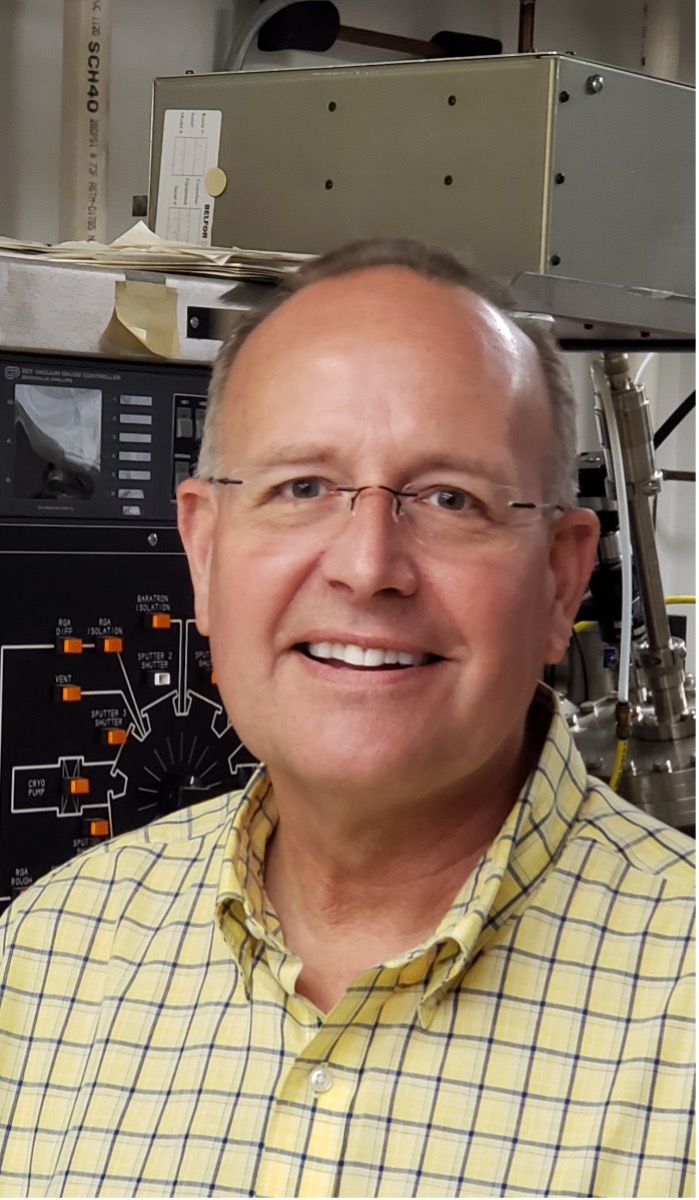 Doug BensenWhen responding to an interview request for this story, Douglas Bensen (B.S. ’85, industrial education), who has worked at the University of Maryland for 35 years, warned that he might be a boring subject. His title on the Department of Physics website is the generic “coordinator” after all.
Doug BensenWhen responding to an interview request for this story, Douglas Bensen (B.S. ’85, industrial education), who has worked at the University of Maryland for 35 years, warned that he might be a boring subject. His title on the Department of Physics website is the generic “coordinator” after all.
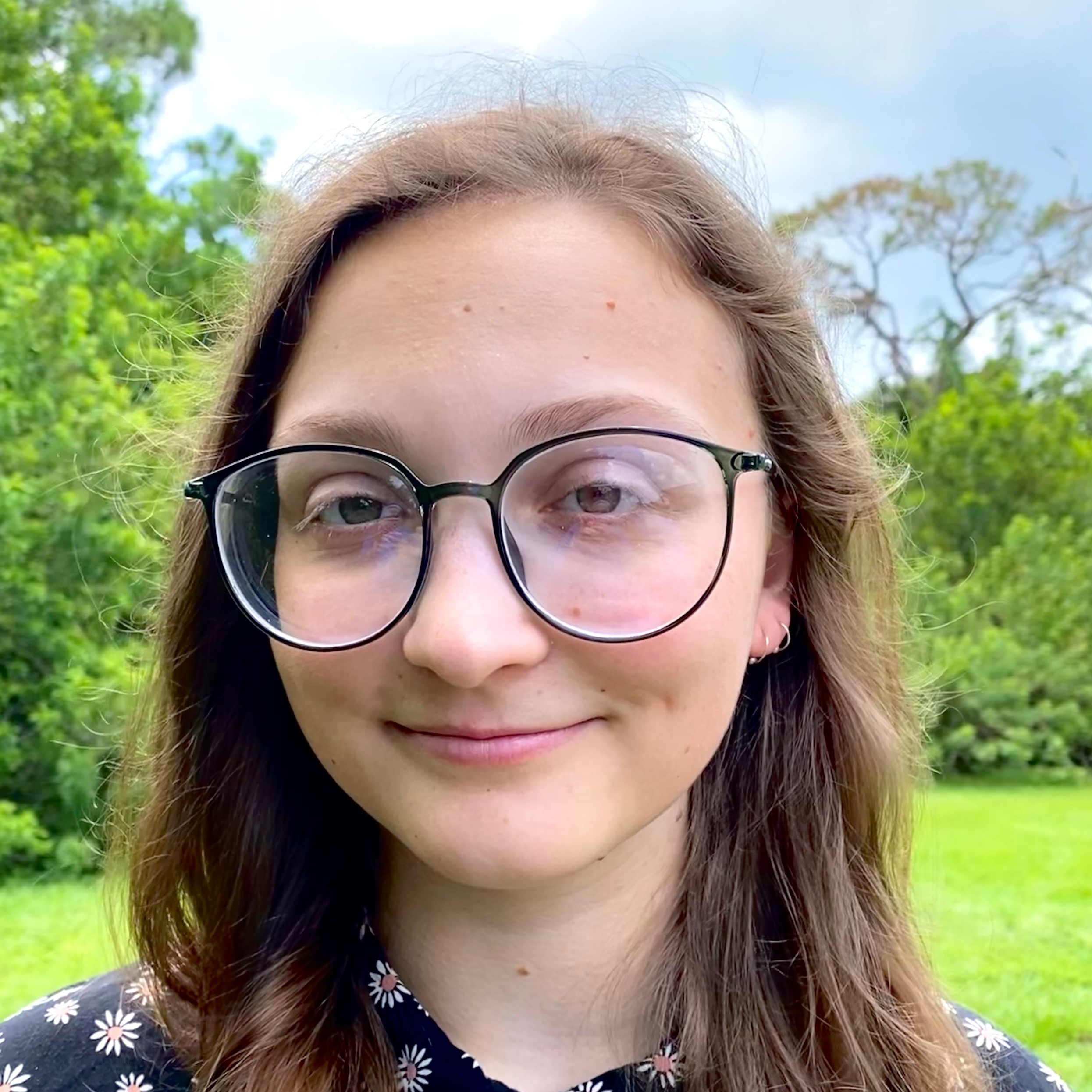 junior physics and astronomy dual-degree student ultimately selected the
junior physics and astronomy dual-degree student ultimately selected the 